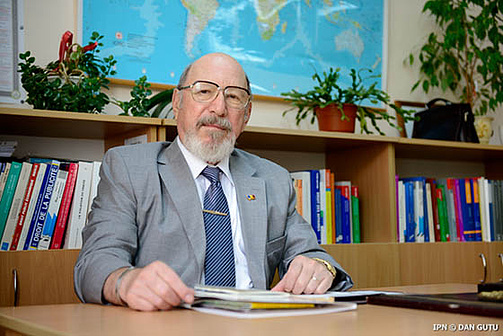---
Earlier, Article 78 (Election of President) created the greatest constitutional obstructions and generated a profound and long crisis. How necessary and possible is the amendment of this article?
Doctor of Law Nicolae Osmochescu, former Constitutional Court judge:
In the original of the Constitution of 1994, the article concerning the election of the head of state provided that the President is elected by universal, equal, direct, secret and freely expressed vote. It was a very clear formula and situation from legal viewpoint. It was clear who and how can run and how the elections are organized. According to this provision, the political form of government in Moldova was semi-presidential republic. In 1998-1999, there appeared serious divergences between the President of Moldova Petru Lucinschi and Parliament. The head of state had a lot of duties, but not many powers and some of the problems could not be solved.
Thus, on July 5, 2005, the lawmakers profited from the situation that there was the necessary number of votes (2/3 of the votes) and amended the Constitution. Article 78 already stipulated that the President is elected by Parliament. This article exists today as well, despite its shortcomings and the ambiguities it causes. By this new article, the form of government was changed from semi-presidential republic to parliamentary republic. The President can be elected by the votes of 3/5 of the MPs, which is 61 votes. The modified article says that if the head of state is not elected, the second round of voting is held. If the necessary number of votes is not gathered after the second round, the elections are rerun. The ambiguities start from here. How many times can the elections be rerun? Nothing is said about this in the Constitution or in the Election Code.
The solution is to modify Article 78 by stipulating clearly that if the head of state is not elected after the second round of rerun elections, Parliament must be dissolved. Owing to this ambiguity, Nicolae Timofti was elected President in 2012 with great difficulty. We can face a similar situation in the future because I don’t think that the required 2/3 of the votes will be garnered in the future Parliament.
Attempts were made to modify this article by referendum, but most of the voters didn’t understand the essence of the plebiscite question. From legal viewpoint, society does not have juridical knowledge and is not ready to adopt such documents by a referendum.
The perfect variant would be to amend Article 78 so that the President is elected by the people. This is the best solution for the Republic of Moldova as the head of state will have definite powers and duties.
A number of changes are needed to ensure the functionality of the Constitution concerning the election of the administrative bodies of the state. The prosecutor general, judges, court presidents, the Audit Office president and other functionaries must be elected by the executive or the head of state, not by Parliament because all the persons named by the legislative body are influenced by the political interest of the lawmakers, given that they are elected according to political criteria, as a result of political negotiations.
---
The Constitution of the Republic of Moldova
Article 78 Election of the President
(1) The President of the Republic of Moldova is elected by Parliament by secret vote.
(2) The candidates for the post of President of the Republic of Moldova must be older than 40, have lived in the Republic of Moldova on a permanent basis for not less than 10 years and know the official language.
(3) The candidate who polls 3/5 of the votes of the elected MPs is considered elected. If no candidate gains the necessary number of votes, a second round of voting is held between the two candidates who polled the largest number of votes in the first round.
(4) If no candidate wins the necessary number of votes in the second round, the elections are rerun.
(5) If the President of the Republic of Moldova is not elected as a result of the rerun elections, the acting President dissolves Parliament and sets the date of elections to choose a new Parliament.
(6) The procedure for electing the President of the Republic of Moldova is set by organic law.




